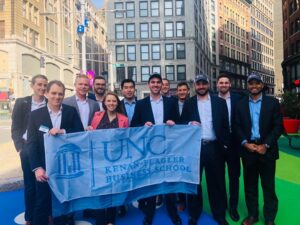Perspectives
Focusing on the energy transition and sustainability

When Anthony Miner (MBA ’21) first embarked on his post-college career, his goal was to build business acumen, learn from smart colleagues and pay off his student loans.
He couldn’t have imagined he would one day be leading the charge addressing energy transition and sustainability challenges as a corporate strategy senior manager at Caterpillar, the world’s leading manufacturer of construction and mining equipment, off-highway diesel and natural gas engines, industrial gas turbines and diesel-electric locomotives.
Miner has found his passion in the energy and sustainability sectors, and his MBA at UNC Kenan-Flagler Business School helped him put it into action.
Born and raised in Seattle, Miner studied business at the University of Washington, where he majored in finance and supply chain management. Without a clear idea of what he wanted to do professionally, he started a career in management consulting at PwC, which turned out to be an ideal learning experience just after college.
“It was a great opportunity to learn from bright individuals and to build a business toolkit while getting paid for it,” he said. “It seemed like the right choice for somebody who didn’t know what they wanted to do.”
Miner was at PwC for five years, where he primarily supported clients in the tech industry along the West Coast.
“It gave me a fantastic baseline knowledge of business program management and how to work with diverse sets of stakeholders,” he says. “I really built business acumen that is critical no matter what I do in the business world.”
There was just one problem: The career path he was on ultimately didn’t align with the types of challenges Miner was most passionate about solving.
Shifting the focus to energy transition
Miner had developed a professional interest in sustainability and, particularly, energy transition – the global shift from fossil fuels to cleaner energy production – towards his senior year of college.
“I took a global warming class with my extra credits during my senior year of college,” he recalls. “That piqued my interest, but I put that on the back burner when I started my consulting career. I still found myself listening to energy podcasts and trying to figure out how to break into the industry.”
Miner saw an MBA as an opportunity to realign his career with this overall goal: growing his existing business acumen and putting it to work for sustainability.
“This led me to targeting UNC Kenan-Flagler because of the School’s Energy Center and the Ackerman Center for Excellence in Sustainability,” he says.
“I was really impressed by the level of seniority that the Energy Center brought in to teach the coursework,” he says. “It was fantastic to learn from people leading prominent energy companies.”
He was impressed by the breadth of the curriculum in the energy concentration, which covers the entire “energy value chain” and he got the opportunity to meet with professors, including the director of the UNC Kenan-Flagler Energy Center, Stephen Arbogast.
Once he’d determined that he liked the curriculum at UNC, it only took stepping on campus for interviews to be further impressed.
“I met with the students and started to appreciate the culture and how open everybody was, which reminded me of PwC” he says. “It was a very welcoming environment instead of a cutthroat, competitive one.”
I’m interested.
Complete the fields below and we’ll be in touch with more information about our Full-Time MBA program. Fields marked with “*” are required.
Extracurriculars prepare for leadership
Fresh out of a career in consulting, Miner was no stranger to a busy schedule or the need to juggle multiple priorities. However, the MBA at UNC Kenan-Flagler really put him to the test – in a good way.
 “I think the thing that surprised me most was the breadth of opportunities and activities you can get involved in when you’re starting the first year of the MBA program,” he says.
“I think the thing that surprised me most was the breadth of opportunities and activities you can get involved in when you’re starting the first year of the MBA program,” he says.
One of these was the MBA Energy Club, of which Miner became president in his second year of the Full-Time MBA Program.
“Being Energy Club president was the most fulfilling and rewarding experience I had at UNC Kenan-Flagler,” he says.
“It helped me prepare to be a leader in the energy industry,” he says. “I had to coordinate across faculty leadership and my vice presidents in the club while also interacting with external companies to provide a rewarding experience to our club members. It was a nice opportunity to test myself and my ability to delegate, to work across varying groups of people, and build a strategic plan that we could execute against.”
For instance, Miner helped set up an Energy 101 speaker series, bringing in prominent speakers spanning industries such as clean tech, oil and gas, and energy services.
While he was president the club also organized business treks for its members to Boston, Washington, D.C., and Houston, so students could see these companies up close.
Practical training from industry leaders
In addition to creating value for his classmates, Miner absorbed as much value as he could from his professors via classroom teaching, with particular highlights being the energy value chain, business of power, and business of renewable energy courses.
“I was really impressed by the level of seniority that the Energy Center brought in to teach the coursework,” he says. “It was fantastic to learn from people leading prominent energy companies.”
The Ackerman Center for Excellence in Sustainability also gave Miner access to valuable learning, much of which he still uses in his role today, particularly when it comes to his work developing Caterpillar’s first-ever “scope 3” greenhouse gas emissions inventory.
Miner says that learning from Professor Olga Hawn’s coursework about greenhouse gas accounting and how companies can use sustainability to think strategically, provided tactical, real-world lessons he uses to this day.
Tapping into a powerful network
The professors’ dedication to student success went beyond merely classroom teaching. One of Miner’s strongest memories from the MBA was being invited to Arborgast’s house for dinner with other energy students.
“It was such a sincere gesture – to open up his home, introduce us to his family, cook us a meal,” Miner says. “It really opened my eyes to how much he cared about us and the program. He really went above and beyond as a faculty member.”
Indeed, Miner says Arbogast regularly checked in with students throughout the program to ensure that they were on track with internships and job applications and was quick to help whenever they needed it.
“It speaks to the power of the network at UNC Kenan-Flagler,” he says. “He is one of many people who helped me along my journey.”
Do your research
When it comes to his advice for students looking for a similar career trajectory, Miner has two key pieces of wisdom.
“One thing I would recommend that any student do, whether you’re interested in energy or any functional passion area, is to really research different business schools and understand which ones provide you with the network and the access to do that kind of work,” he says.
“The companies recruiting on campus speak to how feasible it will be for you to work in that kind of profession.”
Miner’s second piece of advice is simpler, but perhaps even more important: Throw yourself into it.
“My biggest piece of advice to anyone doing an MBA is to dive in head-first,” he says. “If you’re getting a full-time MBA, it’s an extremely rare opportunity to spend two years investing in yourself.
“Take that to heart and get involved – give back, try to learn about things you don’t understand, and meet people from different backgrounds than yours.”